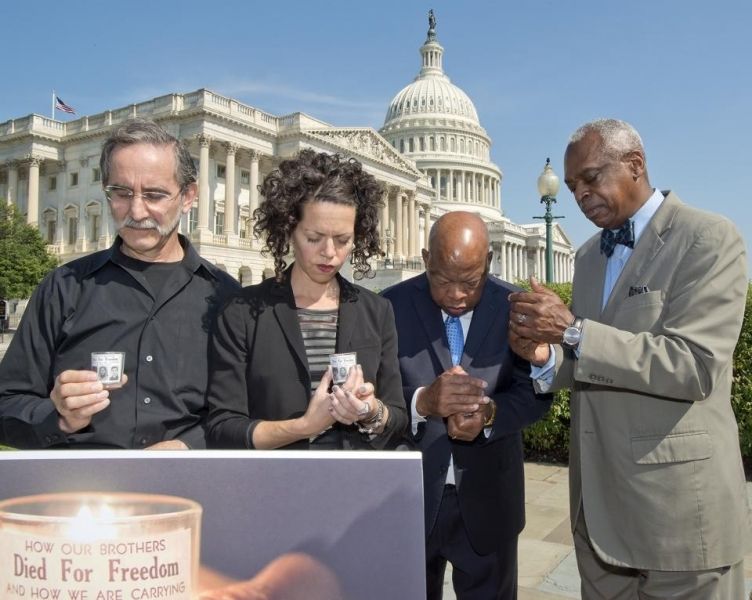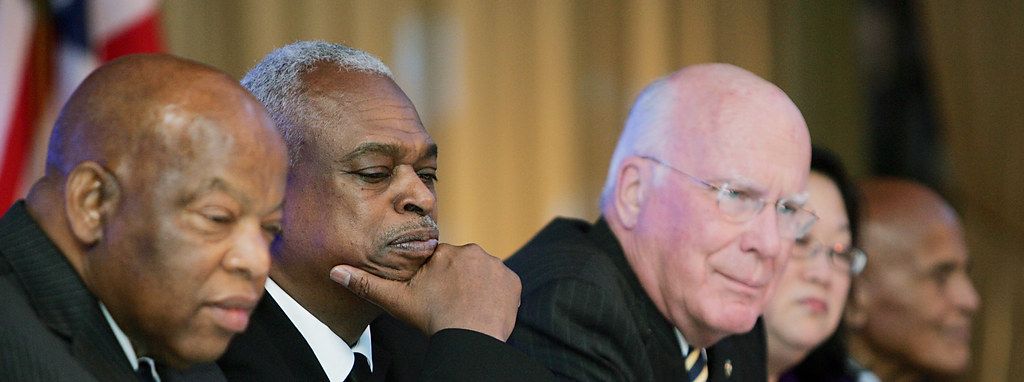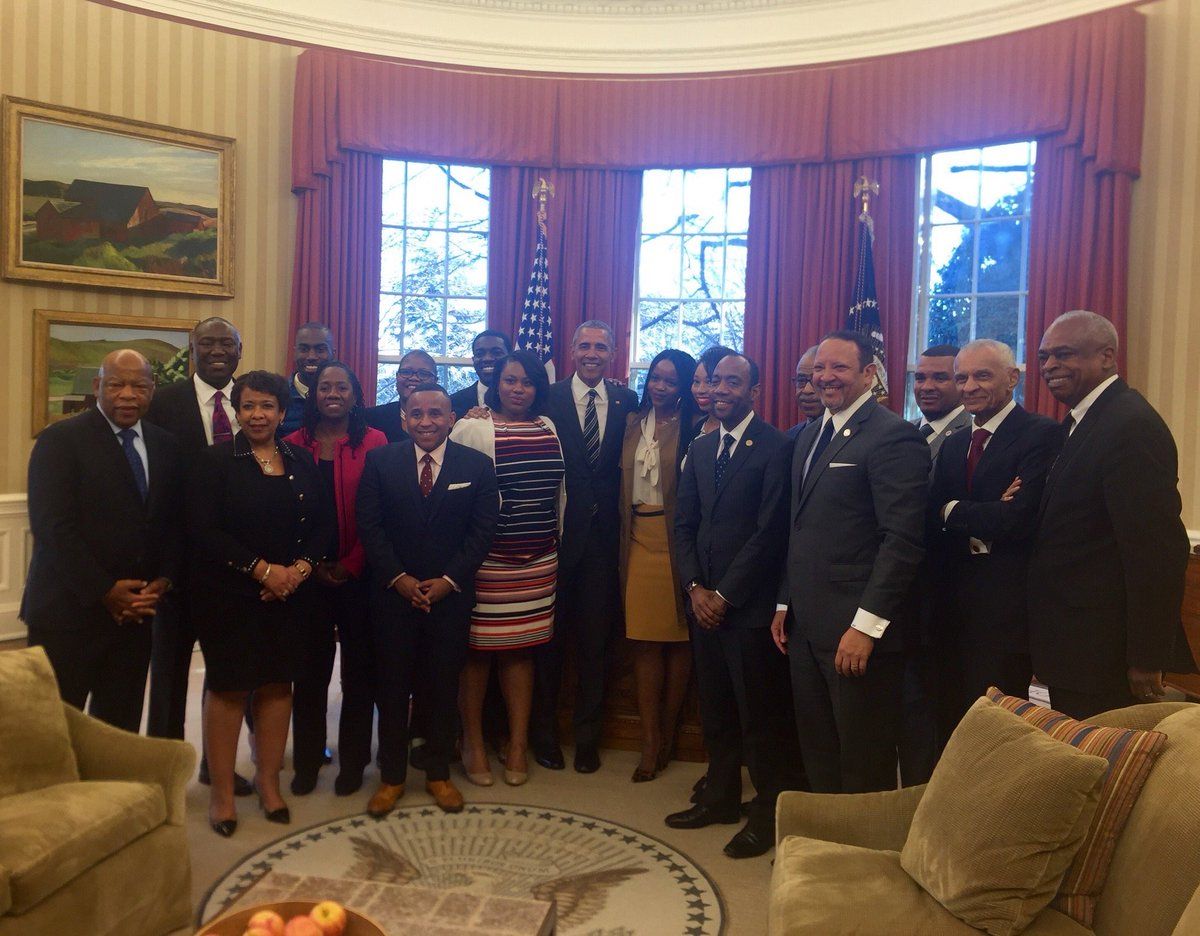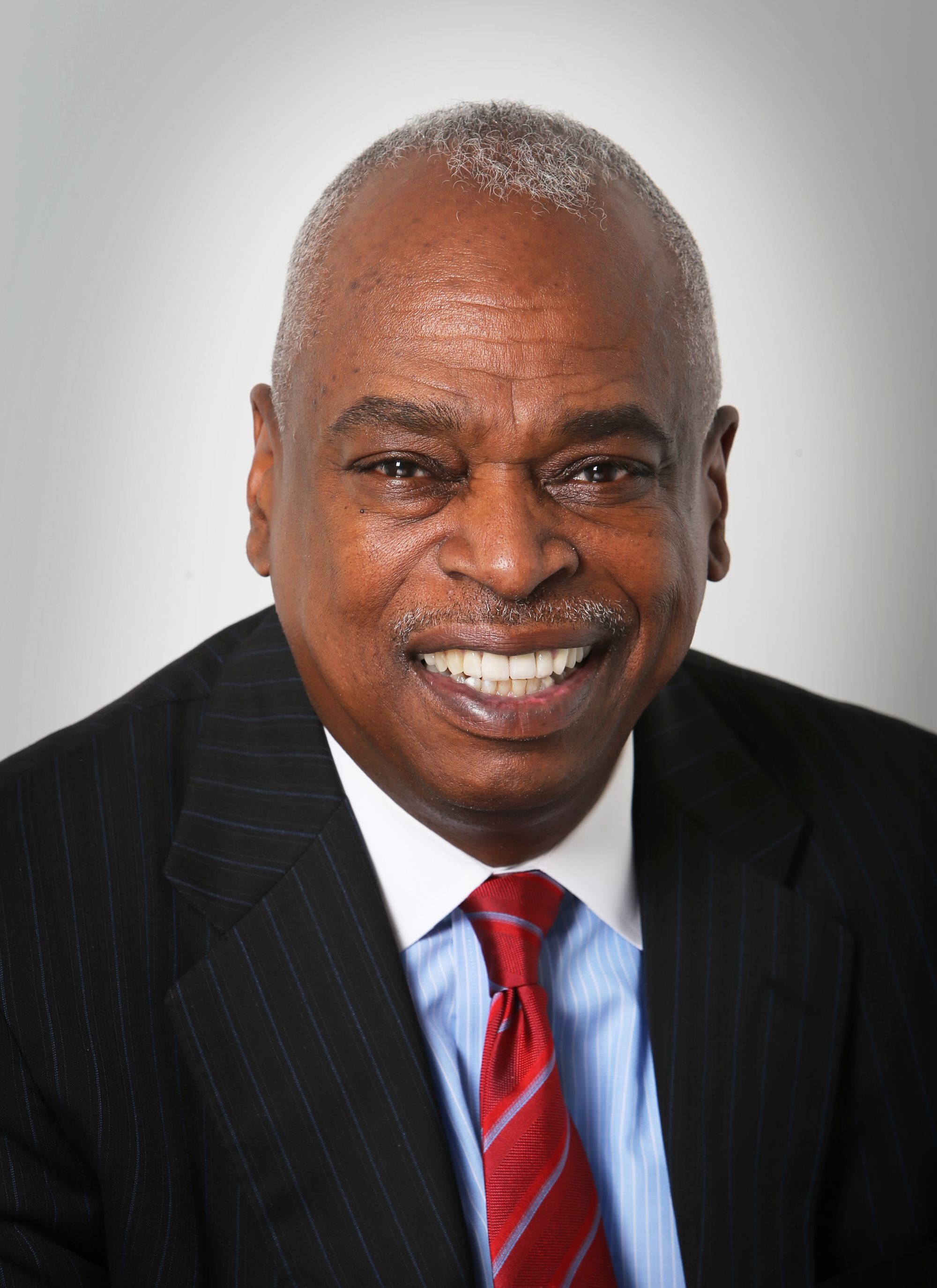Wade Henderson was the President and CEO of the Leadership Conference on Civil and Human Rights, which was founded as the legislative arm of the civil rights movement. Additionally, Wade was the head of the Washington Bureau of the NAACP and worked with the ACLU. Henderson spoke with Indu Pandey in early August.
Can you comment on the role that American anti-racist movements have in international struggles and how our current political moment might contribute to an international reckoning with discrimination, racism, and identity?
In order to answer your question properly, I need to provide just a bit of history. You mention that the civil rights movement, and we’re really talking about the modern movement of the 20th century, could be seen as a product of the anti-colonial movement in Africa in particular. To a degree, that’s true, but I honestly think it’s the other way around. The domestic advocacy for civil and human rights by the NAACP beginning at its founding 1909 helped to lay the foundation for the anti-colonial activity that followed World War I. The NAACP as an organization was born in fire.
In the 1930s and 1940s, there were real efforts on the part of W. E. B. Du Bois, who had an early stint with the NAACP as the editor of Crisis Magazine, but came back for four years from 1944 to 1948 and helped lead the organization in pushing for anti-colonial activities along with people like Paul Robeson and others. They gave that movement vitality. But, I think in 1948, the NAACP made a judgement that investing in a two-front campaign became a challenge beyond their capability. They devoted themselves really beginning in 1948 or 1950 more exclusively to domestic advocacy.
There has long been a recognition on the part of civil and human rights advocates in this country that we are tied to an international movement of liberation. And often at times we have been in a position to offer leadership and support. The African National Congress, for example, credits the NAACP and its founding, its structure, with some of the advance efforts that have taken place in South Africa. There is clearly, you know, an appreciation even now of the Black Lives Matter Movement. In the aftermath of George Floyd’s killing, not only did it explode domestically, but there have been over 4,000 demonstrations globally that have used the Black Lives Matter emblem as an indication of its own involvement. And, yes, it has inspired the people of color citizens of those countries to respond to their own domestic challenges around race. I think the movement has already had broad impact and is consistent with the way that the civil rights movement would have hoped to influence liberation.
Reparations for slavery have seen a resurgence in interest. Given your efforts to secure reparations for Japanese Americans who were interned during World War II, why do you think reparations are justified? What would you say to someone who disagrees?
The issue of reparations for injustices that have been experienced by you or your predecessors in ways that have contemporary impact on your life today is a concept that’s almost as old as Judeo-Christian law. There’s a concept in Roman Law: ubi sum ibi remedium. It means for every wrong, the law recognizes a remedy. That’s an idiom, a Latin idiom. But, it’s handed down over the generations to establish the concept both in law and in equity. When injustices occur, there has to be a remedy in the law to address that injustice once the injustice has been established. Reparations legislation has been around for quite some time, in fact, since 1989, when Congressman John Conyers, the to-be first African American chair of the House Judiciary Committee, introduced the first version of H.R. 40. H.R. 40 was the bill to establish the commission to study reparations, and it has been introduced every term in Congress since John Conyers first proposed it. The bill has begun gaining traction on the notion that the concept of reparations should be studied.
You note that I worked on the Japanese American redress bill. It was called the Civil Liberties Act of 1988. And in fairness, my role was de minimis in comparison to the non-governmental organizations like the Japanese American Citizens League (JACL) and the Asian American congressional leadership, including Congressman Norman Mineta, Spark Matsunaga, and others. But, it was JACL that in 1970 voted on a resolution urging the federal government to provide a commission to study reparations for Japanese Americans who were interned during World War II. From that effort, a movement grew, which ultimately demanded justice under law. And, in the end, we compensated Japanese Americans inadequately (there is no adequate compensation in this context) with US$20,000 in cash payments, a monument here in Washington D.C. dedicated to that injustice, and an apology from the federal government. This is obviously scant relief. But, it was symbolically very important and very satisfying.
I understand that there is a concern about the indebtedness for those who had themselves no direct holdings of enslaved people. On the other hand, there are many that have benefited significantly from the system that provided the benefits and the stature that they have enjoyed and their families have enjoyed. This is an issue for which the time has come. And, I think that the George Floyd murder and the Breonna Taylor killing have not only invoked a conversation about criminal justice reform but a much broader discussion that the American people for the first time seemed to have embraced. There is an abundance of documentation that more than justifies a more thorough review of the reparations question. I just think the issue is finding the courage as a people to do so.

The slave trade was an international phenomenon. It occurred between a number of European countries, the United States, present-day Canada, a number of countries in the Caribbean, South America, and Africa. Clearly the discussion has to acknowledge many actors’ complacency and perpetration of violence. How do we go about understanding the reparations question in an international context?
First of all, as you say, the United States was not the only country that engaged in the enslavement of African people. Yes, there were many in Europe that took part in the slave trade and made considerable fortunes for their countries in their abuses. Back in 2016, the 15 CARICOM nations, those are the Caribbean nations and former colonies of European countries that are now independent, have explored the option and, in fact, have filed a suit in international court against 11 European countries, who were former colonial powers. They are pushing Europeans to acknowledge the current circumstances under which these countries fare and that they attribute to the existence of slavery. It’s going to be a hard lawsuit to win. And, bringing it before the International Court of Justice has its own sort of built in limitations. But, to assume that the European Union and the individual countries don’t have some indebtedness to their former colonies is something that needs to be deeply explored.
These questions are not merely to be limited to African Americans when there are appropriate remedies. The Supreme Court of the United States just handed down what looks like a landmark decision in the rights of Native Americans: McGirt v. Oklahoma. It upheld treaty rights of the Native American tribes of Oklahoma and their ability to assert their jurisdiction over certain criminal justice issues. It seems like an esoteric matter, but it was one of the first significant Supreme Court cases to uphold tribal rights for the indigenous population of the United States in a way that I think has significant implications for the future.
These questions of reparations are not just questions of how we reconcile the past but also what the past’s impact is on the present. Reparations are not merely compensation for past injustice. It is a recognition that current circumstances flow from these difficult questions. Intersectionality, which has been mentioned in some instances between race, sex, and class, also comes into play. You see it here in the COVID-19 crisis with the irony of the so-called essential workers being defined as people who are on the frontlines providing food services, groceries, meat packing plants, providing essential services. They’re given this lofty title of essential workers, but they are paid a pittance, they lack the protections in the workplace that a union would provide, and they are exposed in life-and-death circumstances without adequate protection. These practices trace their roots back to the intersection of race, poverty, and enslavement. This is not an accident or coincidental. It is a result of law and policy and only by recognizing that are we able to make advances.
You mention intersectionality. How do we find common ground between people who have some interests that converge and some that diverge?
That is, I think, an especially difficult and challenging question. I think it is the basis for much of our international involvement. And, the birth of the United Nations stems from that kind of need for a forum where international disputes could at least be discussed and potentially resolved. As difficult as international affairs have been since the birth of the United Nations and as challenging a time as we have had for the last 75 years, this is a time to appreciate the importance of that concept and rededicate ourselves to those international bodies that play such an important role.
I think that in this post-pandemic world—I hope—there will be a renewed appreciation for the importance of engagement at the international level. The World Health Organization (which has been criticized by the United States and has been to some degree scapegoated for the COVID-19 pandemic reaching American shores) is perhaps more important now than ever. And, that has been demonstrated by the experience that we’ve had. The level of cooperation that is needed is obvious now, especially after some of the scandals that have come out of the administration’s handling of international affairs. I would say that as part of a fresh start initiative, that hopes to rebound from some of the real difficulties that confront democracies around the world and American allies is that there needs to be a renewed commitment to human rights, to engagement at the international level. I think that all of that has become increasingly important, and I think that a wider appreciation of that from the American people is going to have to be encouraged, nurtured. We’re going to have to go against this effort at American exceptionalism in a way that has been portrayed in the last three or four years.
And, as I said, this country has been envied, we’ve been hated, we’ve been admired, imitated. But never have we been pitied. And, currently we are being pitied by others in the world because of the way in which we’ve responded to the pandemic. I think that it has exposed some weaknesses in American democracy in ways that need to be shored up. I think that the current circumstance involving our race in this country is a national security question in addition to being a civil rights issue. It has made our country vulnerable to manipulation and exploitation that was the example of Russian intermeddling in the 2016 race using Facebook to articulate Black and African American hostilities and concerns. I wager that that’s part of the problem we’re going to have to face going forward.

The United States has had very public confrontations with its handling of identity, race, and power. Does that affect its ability to challenge human rights violations in countries that might be outwardly worse than itself? Does it lose its credibility in those instances?
I know that the Obama administration made a significant effort to invest in some international human rights issues around race. And, in August of 2014, we saw an instance of how the United States was viewed internationally. The United Nations in Geneva was holding a review of US compliance with the Convention on the Elimination of Racial Discrimination. This is one of the international covenants that the United States ratified, back in 1994, and calls on the country to make efforts to reduce racial bias, discrimination, and racism in its own policies and laws. The United States had an impressive delegation to Geneva to represent our country’s interest.
While we were there and preparing to testify, Michael Brown was killed in Ferguson. And the commission that was to review US compliance exploded with that news because the story of how Brown was killed, his body left lying in the street for hours, shocked and appalled members of the international commission. As impressive as our delegation was, it embarrassed the hell out of the American government and raised serious questions about our commitment to the very human rights principles we seem to enshrine. And, the United States has had this problem really from the inception of the United Nations. So it’s not a pretty history.
The one thing I will say though, as far as civil rights advocacy, there were people who understood that contradiction and how to exploit it. W. E. B. Du Bois was one of them, who sent a delegation to the United Nations in the 1950s to argue on behalf of the rights of African Americans. So, there have been attempts in the past to use that contradiction to advance the broader goal of equality. And, that pertains not just to the United States, but to other parts of the world as well.
How do we renew the credibility of international organizations for smaller or more peripheral countries that don’t believe in the power of those organizations or view them as not in their interests?
That’s tough. You know, I am hopeful that the climate change debate will attract a greater focus in this country in the aftermath of the pandemic and hopefully some other changes in our government’s approach to these issues. I think the withdrawal from the Paris Accord sent an incredibly damaging signal to the smaller countries that are facing tremendous impact from climate change unchecked. And, we are reaching a critical point in the world’s ability to respond to the problem, and I think that urgency—I hope—coupled with a recognition that the global economy is so incredibly interconnected that solutions have to be more than nation-based. They have to be more global in nature. So, I do think there are certain urgent international functions that I hope will have renewed focus. Again, I mention the World Health Organization. I think in the aftermath of this pandemic, there has to be a renewed focus on ensuring a level of cooperation and collaboration that helps to facilitate our next response when needed. So, I do think that’s important.
And I think that there has to be a greater appreciation for the role that journalists are playing in helping to educate the world about what’s going on. I note with great concern, the circumstances of journalists around the globe who are doing incredibly courageous work and face a serious threat. Again, I think Jamal Khashoggi and his murder raises to the highest level the threat that journalists face around the world. And, there has to be a greater appreciation on the part of Western powers, hopefully to be led by the United States in a more robust fashion, a commitment to speaking up on behalf of those who report the information so necessary to understand what’s happening in the world. Now, these countries may not have a First Amendment as we do, but nonetheless, the principle of protecting a “free press” is something that is enshrined as a principle of American democracy. I hope that this becomes a point of attention.

Respecting the rights of indigenous people is inherently an international issue. How do we start the conversation on indigenous rights? Is there a place for solidarity?
I believe in the power of coalition. The organization that I was privileged to lead for 20 years, the Leadership Conference on Civil and Human Rights, is a coalition of over 200 national organizations, working to advance civil and human rights. We have discovered only in coalition do you have the strength to advance these broad societal changes and goals. Only in coalition do you have that kind of strength. Intersectionality is a huge part of that discussion. Let’s think about it in practical terms.
Right now we have a policy change that is under consideration by the administration: to shut down the decennial census a month earlier than it would have ordinarily be scheduled to end. That means in all likelihood that there will be thousands of uncounted individuals whose absence from the political sphere that the census addresses means that we won’t have the resources for the communities in which they live, apportionment questions and redistricting questions will be adversely affected. In other words, the curtailment of this important function and service is going to have a profound impact on our own democracy. There are clear interests we share in common with a host of groups, the Indigenous being among them, the Latinx community, the Asian American community, persons with disabilities, the count for LGBTQ Americans becomes a huge piece of this.
So, you know, the COVID-19 crisis, ensuring that there is adequate testing, resources, the personal protective equipment, and other things are shared concerns as Americans we share in common. And, we need to find solutions for those problems. But, there are specific areas of focus that have issues involving criminal justice reform that have come into sharp focus or the economy. There will be a shared interest in rebuilding those activities. And, lastly, there is a shared interest in protecting American democracy from subversion. We’ve got to contend with the problems of international targeting, perhaps from Russia or China. But we certainly know that there is a history of that kind of involvement previously, and then we have the problems here of voter suppression, which have been proposed in ways that you see obvious and horrendous.
Stepping back again, for a minute, I do think there has to be a more formal engagement, and that’s why I suggested this resolution on truth, racial healing, and transformation. It is profoundly important and I think needs to be taken into account very seriously. I think there are obviously international examples where those truth commissions have proven some value, not always in the manner we hope. But, I also recognize that our own civil rights movement draws some of its strength from its inter relationship with truth movements aboard. So, the movement by Mahatma Gandhi in India and the recognition by Dr. Martin Luther King Jr. that Gandhi’s principles deserved emulation in this country. The efforts of Congressman John Lewis, who has lauded the importance of a truth, racial healing, and transformation commission. So, I think there are methodologies if you will for addressing these issues. There has to be a willingness to confront. I think right now that consensus is building. That consensus is actually building.

The topic for our magazine for the fall issue is the relationship between security, identity, and power. We wanted to be responsive to the national and international conversation we’re having about these sorts of topics, and I was wondering if you could talk a little bit about what you think the relationship between power and identity is?
The United States had an identity that was shaped by certain fundamental principles, but that also reflected a level of power, particularly in the aftermath of World War II when we emerged as one of the world’s great super powers. And, part of our identity and power were based on a perception that had not been tested in the most rigorous way. I would think that the Vietnam War was one of the first efforts to test our power and, in doing so, exposed the limits of American power and authority and exposed to the world a bit of a myth that it had been based. Obviously the acquisition of weaponry, including the atomic bomb, gave us a sense of profound invincibility.
As I said before, we have been admired, feared, loved, and hated, but we never have been pitied. And, I think that the current response to the pandemic and the other crises that we face: the race question which has burst onto the scene (not just domestically but internationally); the economy which is in shambles; and our civic engagement—the voting apparatus is being questioned in ways that I hope do not undermine—or could undermine— the election in significant ways. That is affecting the way the United States is perceived abroad. The decision to invoke a philosophy of “America First” which seems to suggest a new isolationist policy that has us withdrawing from international bodies, disrupting prior agreements (like the Iran Nuclear Accord). Having total disdain for our allies (NATO) is another example. So, right now, I think the perception is one of instability, uncertainty, and anxiety. And, while we have power, it is potentially being used indiscriminately internationally. For example, the murder of the Iranian general, which was considered an extra-judicial killing, raised real questions about our functioning under the rule of law.
That undermines the perception that we were a country committed to core democratic values. The use of power, and the indiscriminate use in some ways, coupled with our incompetence in handling a globally shared crisis, that other countries with fewer assets and resources and capabilities, seem to handle the crisis better than we, raises real questions about our perception of us internationally, the perception of ourselves domestically, and the power that we have and how we think we’re going to use it. I think the relationship between identity and power at the international level is symbiotic. However, you see instances where identity can be shaped by power. I’m sort of thinking about Turkey. Turkey went from being the Ottoman Empire to being a modern state. Kemal Atatürk turned Turkey into a modern and secular state and took conscious efforts to remove religion from the civic life of Turkey. And thus, he helped Turkey help lay the foundation for Turkey being a part of NATO because it was perceived as a European-style—I won’t go too far in that regard—but less of a Muslim nation.
When Turkey decided to take its museum, the Hagia Sofia, and restore it to a mosque, it seemed to be a reversal of that effort to create the secular identity, which has existed for 80 years or so. And, you know, it’s an example of power being used to shape identity. And, that is just another example. It’s a complex question you’ve asked.




